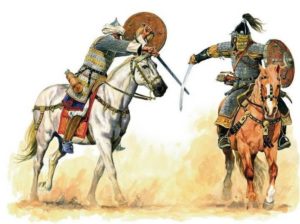1260
Mongols smacked down
One of the most consequential battles in world history that most people are unaware of took place on this day in present-day Israel, north of Jerusalem at a place known as Ain Jalut or Goliath’s Spring. It was there that an army of the all-conquering Mongols was met by a force of Mamelukes from Egypt.
For three generations vast Mongol armies had erupted on to the civilized world, smashing those who resisted them, and setting up an empire that stretched from Poland to the South China Sea. In the late 1250s it was the turn of the Muslim kingdoms of the Middle East. In 1258 the Mongols sacked Baghdad so brutally that its loss is still blamed for the centuries-long decline of the Islamic world. It was then the turn of the Mamelukes of Egypt. To their ruler Qutuz, the Mongol Khan Hulagu sent the following chilling message:
From the King of Kings of the East and West, the Great Khan. To Qutuz the Mamluk, who fled to escape our swords. You should think of what happened to other countries and submit to us. You have heard how we have conquered a vast empire and have purified the earth of the disorders that tainted it. We have conquered vast areas, massacring all the people. You cannot escape from the terror of our armies. Where can you flee? What road will you use to escape us? Our horses are swift, our arrows sharp, our swords like thunderbolts, our hearts as hard as the mountains, our soldiers as numerous as the sand. Fortresses will not detain us, nor armies stop us. Your prayers to God will not avail against us. We are not moved by tears nor touched by lamentations. Only those who beg our protection will be safe. Hasten your reply before the fire of war is kindled. Resist and you will suffer the most terrible catastrophes. We will shatter your mosques and reveal the weakness of your God and then will kill your children and your old men together.
Qutuz replied by killing the Mongol emissaries and displaying their heads on the walls of Cairo; he then led his army into Palestine. There his numerically-superior forces met a Mongol division strengthened by the knights of local Christian territories who had been intimidated into aiding the invaders. Using the old fake-retreat-hidden-ambush trick the Mamelukes pounced on the too-confident Mongols and killed all those who did not retreat. This battle marked the end of this wave of Muslim expansion westward, leading many historians to wonder what would have happened if the outcome had been reversed. One of these has speculated thus:
Had the Mongols succeeded in conquering Egypt, they might have been able to carry on across North Africa to the Straits of Gibraltar. Europe would have been surrounded from Poland to Spain. Under such circumstances, would the European Renaissance have occurred? Its foundations would certainly have been far weaker. The world today might have been a considerably different place. As it was, the Mamluks not only stopped the Mongols’ westward advance, but—just as important— they also smashed the myth of Mongol invincibility. The Mongols’ belief in themselves was never quite the same, and ‘Ain Jalut marked the end of any concerted campaign by the Mongols in the Levant. In saving Cairo from the fate of Baghdad, the battle of ‘Ain Jalut also sealed the doom of the relatively weaker remaining Crusader states. Mamluk Egypt rose to the pinnacle of Islamic political, military and cultural power, a position it maintained until the rise of the Ottomans some 200 years later.
Things did not go well after the battle for either of the two leaders. Qutuz was assassinated on his way home by one of his generals and Hulagu faced rebellions from other Mongol princes.
